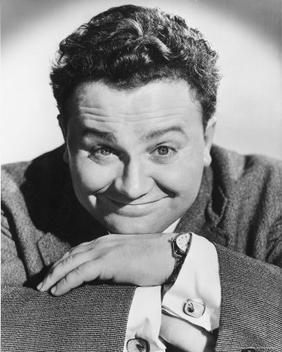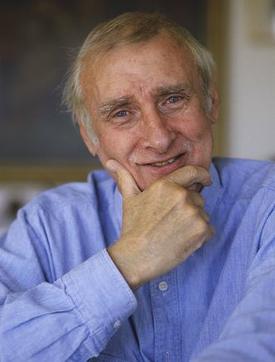Related Research Articles

Sir Harry Donald Secombe was a Welsh actor, comedian, singer and television presenter. Secombe was a member of the British radio comedy programme The Goon Show (1951–1960), playing many characters, most notably Neddie Seagoon. An accomplished tenor, he also appeared in musicals and films – notably as Mr Bumble in Oliver! (1968) – and, in his later years, was a presenter of television shows incorporating hymns and other devotional songs.

Terence Alan "Spike" Milligan was an Irish comedian, writer, musician, poet, playwright and actor. The son of an English mother and Irish father, he was born in British Colonial India, where he spent his childhood before relocating in 1931 to England, where he lived and worked for the majority of his life. Disliking his first name, he began to call himself "Spike" after hearing the band Spike Jones and his City Slickers on Radio Luxembourg.

The Goon Show is a British radio comedy programme, originally produced and broadcast by the BBC Home Service from 1951 to 1960, with occasional repeats on the BBC Light Programme. The first series, broadcast from 28 May to 20 September 1951, was titled Crazy People; subsequent series had the title The Goon Show.

Jim Dale is an English actor, composer, director, narrator, singer and songwriter. In the United Kingdom he is known as a pop singer of the 1950s who became a leading actor at the National Theatre. In British film, he is now one of the last surviving actors to appear in multiple Carry On films.

ITV Channel Television, previously Channel Television, is a British television station which has served as the ITV contractor for the Channel Islands since 1962. It is based in Jersey and broadcasts regional programme for insertion into the network ITV schedule. Until November 2011, Channel Television was one of four ITV companies independent from ITV plc alongside the two STV regions in Scotland and UTV in Northern Ireland. The station has been owned by ITV plc since 2012 and the licence was transferred to ITV Broadcasting Limited in March 2017.

Television South (TVS) was the ITV franchise holder in the South and South East of England between 1 January 1982 at 9.25 am and 31 December 1992 at 11.59 pm. The company operated under various names, initially as 'Television South plc' and then following reorganisation in 1989 as 'TVS Entertainment plc', with UK broadcasting activities undertaken by subsidiary 'TVS Television Ltd'.

William Conti is an American composer and conductor, best known for his film scores, including Rocky, The Karate Kid, For Your Eyes Only, Dynasty, and The Right Stuff, which earned him an Academy Award for Best Original Score. He also received nominations in the Best Original Song category for "Gonna Fly Now" from Rocky and for the title song of For Your Eyes Only. He was the musical director at the Academy Awards a record nineteen times.

Blockbusters is a British television quiz show based upon an American quiz show of the same name. A solo player and a team of two answer trivia questions, clued up with an initial letter of the answer, to complete a path across or down a game board of hexagons.

Television South West (TSW) was the ITV franchise holder for the South West England region from 1 January 1982 until 31 December 1992, broadcasting from studios at Derry's Cross in Plymouth, Devon.

"Dragnet" is an instrumental theme from the radio and television show of the same name. It was composed by Walter Schumann for the radio show, and was also used on the subsequent television series and later syndication of the TV series under the name "Badge 714". The theme is in two parts: an opening signature "Main Title" and the "Dragnet March" used over the end credits.
William Alan Hawkshaw was a British composer and performer, particularly of library music used as themes for movies and television programs. Hawkshaw worked extensively for the KPM production music company in the 1950s to the 1970s, composing and recording many stock tracks that have been used extensively in film and TV.

The Three Musketeers (also known as The Three Musketeers (The Queen's Diamonds)) is a 1973 swashbuckler film based on the 1844 novel by Alexandre Dumas. It is directed by Richard Lester from a screenplay by George MacDonald Fraser, and produced by Ilya Salkind. It stars Michael York, Oliver Reed, Frank Finlay, and Richard Chamberlain as the titular musketeers, with Raquel Welch, Geraldine Chaplin, Jean-Pierre Cassel, Charlton Heston, Faye Dunaway, Christopher Lee, Simon Ward, Georges Wilson and Spike Milligan.
Edward Ian MacNaughton was a Scottish actor-turned-television producer and director, best known for his work with the Monty Python team.
Patrick Cairns "Spike" Hughes was a British musician, composer and arranger involved in the worlds of classical music and jazz. He has been called Britain's earliest jazz composer. Later in his career, he became better known as a broadcaster and humorous author.

The Snow Goose: A Story of Dunkirk is a novella by the American author Paul Gallico. It was first published in 1940 as a short story in The Saturday Evening Post, after which he expanded it to create a short novella which was published on 7 April 1941.
Gerard W. Kenny is an American singer-songwriter, based in London, England. In 1981, he received the Ivor Novello Award for Best Television Theme Music for his song "I Could Be So Good for You", the theme tune of the ITV series Minder.

Get Fresh is a children's television programme that originally aired from 1986 to 1988 in the United Kingdom.
Cyril Ornadel was a British conductor, songwriter and composer, chiefly in musical theatre. He worked regularly with David Croft, the television writer, director and producer, as well as Norman Newell and Hal Shaper. He was awarded the Gold Badge of Merit by the British Academy of Songwriters, Composers and Authors for services to British Music and won a total of four Ivor Novello Awards.
This is a timeline of the history of the former British broadcaster TVS. It provided the ITV service for the South and South East of England from 1982 to 1992.
This is a timeline of the history of the British broadcaster Television South West (TSW) and its predecessor Westward Television. Between them, they provided the ITV service for the South West of England from 1961 to 1992.
References
- ↑ Lane, Richard; Lee, Michael (2017). The History of Christ Church Cathedral School, Oxford. Bloomsbury Publishing. ISBN 9781784422912 . Retrieved 19 May 2019.
- 1 2 3 4 5 "Going Live". The Stage. London, England: 8. 23 November 1973. Retrieved 19 May 2019.
- 1 2 3 4 5 Griffiths, Mary (1 February 1972). "Ed's Good Number". Daily Mirror. London, England. p. 17. Retrieved 19 May 2019.
- 1 2 Gale, Steven H. (1996). Encyclopedia of British Humorists: Geoffrey Chaucer to John Cleese, Volume 1. Taylor & Francis. p. 770. ISBN 9780824059903 . Retrieved 19 May 2019.
- 1 2 "On the record". The Stage. London, England: 12. 18 November 1976. Retrieved 19 May 2019.
- 1 2 "Snow Goose recording". The Times. No. 59868. London, England. 23 November 1976. p. 11. Retrieved 19 May 2019.
- 1 2 3 Oates, David (2 November 1984). "You write it, we'll fix it". The Guardian. London, England. p. 22. Retrieved 19 May 2019.
- ↑ "From the Music Capitals of the World - Dublin". Billboard. Vol. 85, no. 17. 28 April 1973. p. 46. Retrieved 19 May 2019.
The new single from Tina of the Real McCoy is an Ed Welch song, "When Morning Has Gone" (Polydor)
- 1 2 3 4 5 6 7 8 9 10 Barrow, Tony (8 August 1991). "How to Score a Television Hit". The Stage. London, England: 22. Retrieved 19 May 2019.
- 1 2 3 Lone Eagle Publishing Co (2000). Film Composers Directory. Lone Eagle. p. 174. ISBN 9781580650052 . Retrieved 19 May 2019.
- ↑ "Obituary - John Bartlett". The Stage. London, England: 52. 16 August 2007. Retrieved 19 May 2019.
- ↑ Barber, John (23 April 1981). "No flies on Marlowe". The Daily Telegraph. No. 39148. London, England. p. 15. Retrieved 19 May 2019.[ permanent dead link ]
- ↑ "Laconic detective's return". The Times. No. 61263. London, England. 18 June 1982. p. 14. Retrieved 19 May 2019.
- ↑ de Jongh, Nicholas (1 July 1982). "Whitehall - Private Dick". The Guardian. London, England. p. 10. Retrieved 19 May 2019.
- 1 2 Connor, Alan (2016). "20. DUM-dum-dum-DAH. Quiz music". The Joy of Quiz. Penguin UK. ISBN 9781846148699 . Retrieved 19 May 2019.
- ↑ Khan, Naseem (19 December 1979). "The complex art of singing something simple". The Guardian. London, England. p. 9. Retrieved 19 May 2019.
- ↑ Pottersman, Edna; Stanbrook, Alan (14 October 1996). "Television". The Daily Telegraph. No. 43955. London, England. p. 33. Retrieved 19 May 2019.[ permanent dead link ]
- ↑ Pottersman, Edna; Stanbrook, Alan (9 December 1996). "Television". The Daily Telegraph. No. 44003. London, England. p. 31. Retrieved 19 May 2019.[ permanent dead link ]